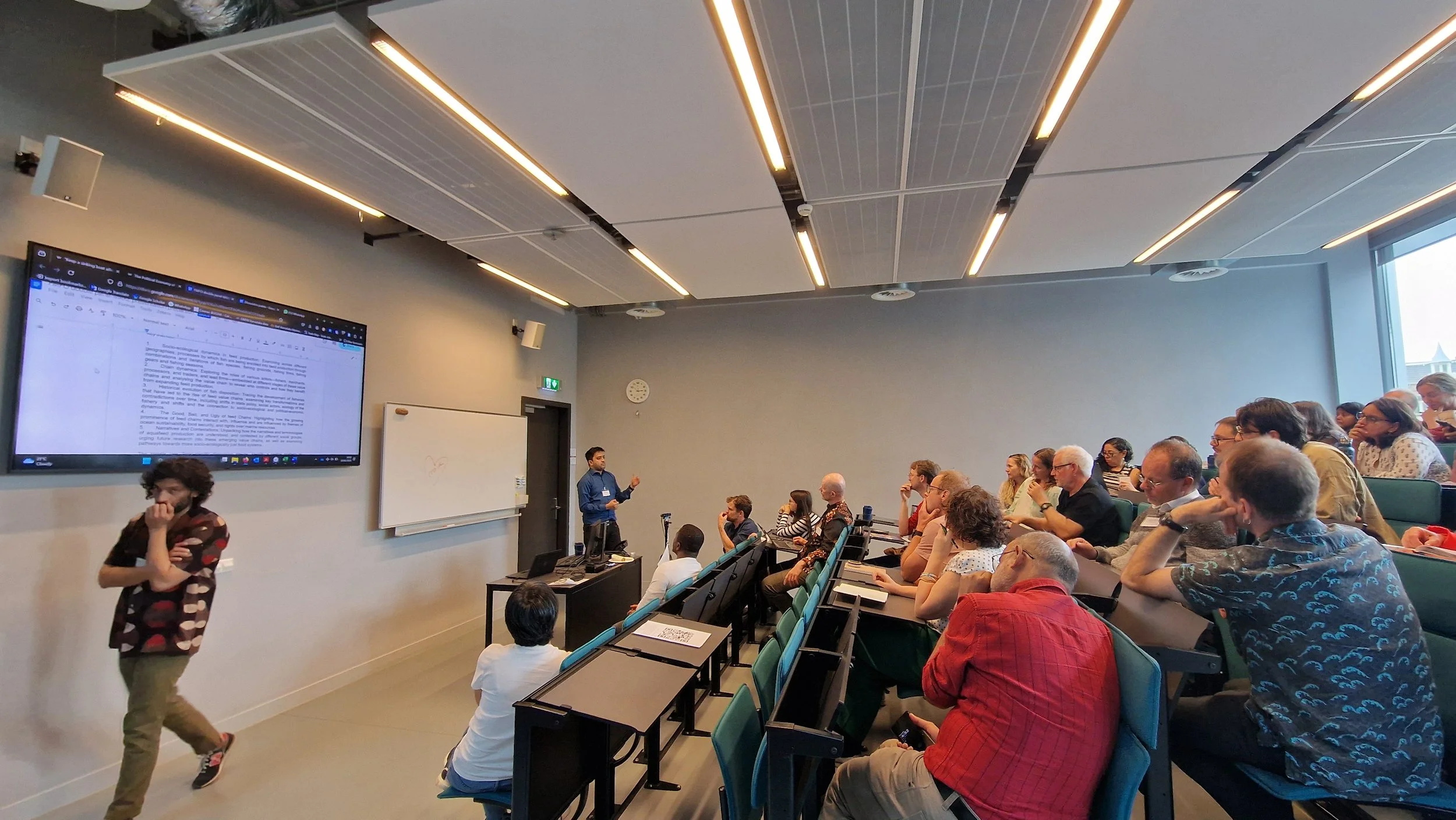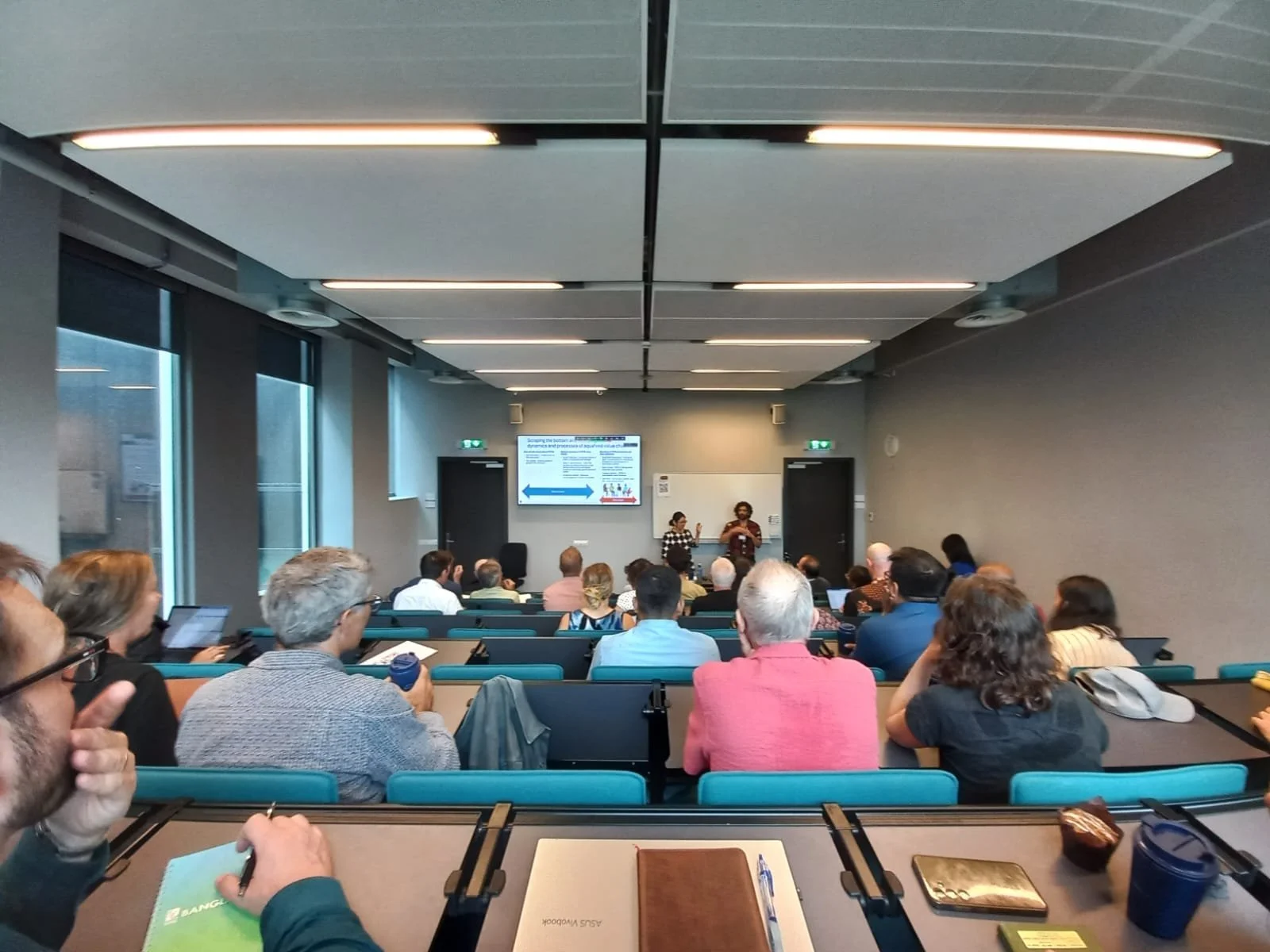MARE Conference 2025
Panel proposal for MARE conference 24 -27 June 2025 in Amsterdam
This year, the MARE conference centers on navigating the delicate balance between the challenges and compromises inherent in managing our marine resources sustainably. The conference explores the transformations needed to ensure a future with thriving coastal communities and vibrant, biodiverse oceans. This is especially pertinent as the conference falls squarely within the UN's Ocean Decade (2020-2030).
Exciting Insights from Our Double Panel on FMFO at MARE 2025!
On behalf of Just Seafood Project, we are pleased to share our experiences from the “MARE Conference” double panel discussion on Fishmeal and Fish Oil (FMFO), taking place from June 24-27, 2025, in Amsterdam, The Netherlands. Our sessions, titled "Scraping the Bottom and Scooping the Top: Dynamics and Processes of Aquafeed Value Chains," were incredibly well-received, fostering rich discussions and shedding light on crucial aspects of the global seafood industry.
Here's a closer look at our esteemed presenters and their contributions:
‘Scraping the bottom and scooping the top’- dynamics and processes of aquafeed value chains
Abstract: The rise of aquaculture has been accompanied by a growing demand for wild feed fish stocks, a crucial composition of the diet of farmed fish. Even as feed efficiencies have improved, the growing volume of farmed carnivorous species like shrimp and salmon continue to require a higher throughput of wild fish. While emerging farmed species such as lobsters, sea bass and golden pompano are creating added demand for wild-caught fish. The aquafeed industry, beyond aquaculture, is also connected to the growing production of poultry in many regions, while fish derivatives (broadly grades of fish meal and fish oil, or some refer to as ‘trash fish’) are inputs to a range of agricultural, medical and cosmetic industries.
To meet the demand, existing supply chains are being augmented and new supply chains are developing (traditional FMFO species and a range of low-value trash fish). Although academic research often focuses on industrial production from species like sardines, mackerel, and anchovies, less attention has been paid to multi-species, mixed-gear tropical fisheries. While the diversion of fish towards feed has been documented in many contexts, a systematic analysis of the scales at which this is occurring across regions, actors, and global value chains has been missing.
This panel’s aim is to bring together contributions that highlight the emerging and consolidating processes by which wild fish are increasingly being converted into a range of commodities that divert supplies towards aqua feed value chains. The double panel examines the drivers and implications of this shift through the following key themes:
Socio-ecological dynamics in feed production: Examining across different geographies, processes by which fish are being enrolled into feed production through combinations and iterations of fish species, fishing grounds, fishing firms, fishing gears and fishing seasons.
Chain dynamics: Exploring the roles of various actors—fishers, merchants, processors, and traders, and lead firms—embedded at different stages of these value chains and analysing the value chain to reveal who controls and how they benefit from expanding feed production.
Historical evolution of fish disposition: Tracing the development of fisheries that have led to the rise of feed value chains, examining key transformations and contradictions over time, including shifts in state policy, social actors, ecology of the fishery and shifts and the connection to socio-ecological and political-economic dynamics.
The Good, Bad, and Ugly of feed Chains: Highlighting how the growing prominence of feed chains interacts with, influence and are influenced by themes of ocean sustainability, food security, and rights over marine resources.
Narratives and Contestations: Unpacking how the narratives and terminologies of aquafeed production are understood, and contested by different social groups, urging future research into these emerging value chains, as well as examining pathways towards more socio-ecologically just food systems.
The panels will utilize topic-specific discussion groups, introducing a central problem or methodology to invite open discussion.
Our Distinguished Presenters
Kick off with a macro view of FMFO:
Before we delve into the intricate national and local specifics, it's essential to grasp the overarching global trends, patterns, and the broad scientific landscape surrounding FMFO. This foundational session provides broader context for attendees to frame the subsequent discussions within a comprehensive worldwide perspective.
Joeri Scholtens (University of Amsterdam): Presenting a macro view on fish dispositions, offering a broad perspective on how fish resources are allocated and utilized globally.
Alin Kadfak, Melissa Marscke, Peter Vandergeest, and Hai Hanh et al. (various institutions): Collaboratively presenting a systematic review of global FMFO literature, providing a comprehensive overview of existing research in the field.
National dynamics of FMFO value chains:
Moving from the global overview, this section of our panel presented the specific and often complex dynamics of Fishmeal and Fish Oil (FMFO) value chains within national and regional contexts. We unpacked how historical legacies, local governance, and socio-economic structures shape the flow of fish from capture to conversion. This isn't just about global demand; it's about the interplay of local actors, policies, and environments that determine who benefits, who is impacted, and how resources are managed (or mismanaged).
Achim Schlueter, Joeri Scholtens, Abibatou Fall, et al. (various institutions): Delving into the economic history of FMFO in Mauritania and Senegal, uncovering the historical development and current dynamics of these crucial value chains.
Prashanth R and Amalendu Jyotishi (FES and Azim Premji University): Addressing resource mismanagement in North Karnataka, shedding light on local challenges and their implications for FMFO.
Siddharth Chakravarty (Queen Mary, University of London): Exploring "Fishing for feed: a continuation or a departure? Strategies for accumulation in Karnataka’s marine fishery," offering insights into the evolving strategies within the marine fishery.
Subu K. Subramanian: Discussing "Trash Fish landing and distribution from major fishing harbours in Coromandel Coasts of Tamil Nadu and Pondicherry states," highlighting the critical role of "trash fish" in regional economies.
Examples of FMFO production and local dynamics:
In this final section, we bring the discussion down to the micro-level, zomming into diverse, on-the-ground examples of FMFO production and its direct impact on local communities and ecosystems. This is where the broad themes translate into tangible realities, revealing the varied ways FMFO is integrated into local economies, food systems, and livelihoods across different geographical and ecological settings.
Sami Farook (University of Manitoba): Focusing on FMFO in Bangladesh dried fish food systems, illustrating the local applications and significance of FMFO.
Colleen Cranmer (University of Ottawa): Examining FMFO in Cambodian inland fisheries, providing a case study of its impact on inland aquatic systems.
Hai Hanh et al. (various institutions): Presenting a Vietnamese case study on lobster supply chains, showcasing the complexities and dynamics within specific aquaculture sectors.


